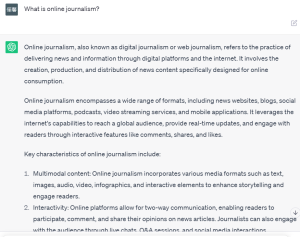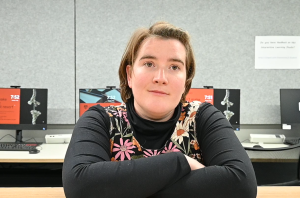
Student use ChatGPT. Source from Pexel.
Since the beginning of this semester, an AI chatbot program has been widely mentioned in campus and daily life which is ChatGPT released by OpenAI at the end of 2022, it has such powerful functions that it can help students to complete essays, codes, article polishing and translation, etc., which has a huge impact on students’ academic life. It is such a powerful tool that raises concerns about academic integrity in the education community.

ChatGPT give the answer of the question. Source from OpenAI.
“I don’t think it should ever make its way into a student’s final assignment, “said Dr Ella Collins-White, an education practitioner from the University of Sydney.
In fact, the use of AI in academic writing by students did not begin with the birth of ChatGPT; essay polishing tools (for example Grammarly) and translation software (for example DeepL) have long been considered by students, especially international students for whom English is not their first language, as useful tools that can help them perform better in academic writing tasks.
- Concerns from non native English speaking students
Concerns about academic integrity caused by the use of ChatGPT in academic writing have also spilled over into the use of these tools, with some Australian universities starting to use tools to check whether students are using AI in their assignments, such as the University of New South Wales, which has issued a statement on May 1 claiming that they will use Turnitin’s new AI detection feature to detect whether students are using AI in their assignments in breach of the rules.
The University of Sydney has added a specific provision on the use of AI in the new revised version of Academic Integrity 2023, indicating that the use of AI by students in academic writing is prohibited unless express permission is obtained from the course coordinator, and emphasizing that this provision also applies to a wide range of writing aids.
Xinyi Li, an international student from the University of Sydney majoring in finance, is also concerned about the matter. “I have seen Australian college students discussing this issue on some online platforms, and my classmates have also mentioned it in our chats. In fact, we were all a little confused. Especially as international students, we use translation software or grammar correcting software just as a tool to help us reduce writing mistakes,” she said.
When asked if she was panicked by the fact that Australian universities are starting to use tools to detect AI, Miss Li replied, “A little bit. Since I don’t know which software will be judged as AI. If Grammarly counts, the future is a little hard to imagine.”
Dr. Collins-White gave her opinion on such doubts, “I don’t think that’s the plan at the university context anyway. Not from the discussions that I’ve heard. I don’t think there’s a plan to ban translation apps or translation tools.”
On how to determine the use of AI in academic writing, she explained, “So far, to my knowledge, we actually haven’t had any, we don’t have any technology to address that yet. So far in my experience of marking students’ assignments, it’s been up to the tutor to try and identify if they feel there’s a case of plagiarism in relation to AI.”

Figure shooted by Lixin Chang, on May 9th: Dr. Ella Collins-White is being interviewed.
- Fair or unfair
The issue of using translation software and grammar correction tools in academic writing being judged as dishonest by AI testing tools has led to a debate about fairness for non native English speaking students.
Although Australian universities require international students to have some ability to use English, most non native English speaking students still have concerns about the use of English when writing academically.
“I don’t think it’s fair. Learning a language is a lifelong endeavor, and even as college students, non-native English speakers don’t have the same vocabulary as native English speakers,” Miss Li shared her opinion.
Dr. Collins-White shared the same opinion in the discussion on this issue, “I think if translation software was banned altogether, yeah sure I think that’s pretty unfair.”
- A double-edged sword: Should universities ban AI?
Although ChatGPT is seen by some schools as potentially contributing to increased problems of academic dishonesty, it is not without any merit in learning.
“I definitely think it has some benefits,” Dr. Collins-White said, “I think it can be interesting giving you that groundwork, I guess, to go off and find new sources.”
Watch the video to see Dr. Ella Collins-Whit show her opinion on the advantages and disadvantages in using AI in study life.
Miss Li also said that she sometimes uses AI to collect data, while some of her classes this semester required them to use ChatGPT to aggregate data and create tables. As Dr. Collins-White said, “It’s just a tool, although it’s very powerful.”
“The advantage is that if I give a directional description, AI will find what I’m looking for. It’s much more accurate, much faster and much more efficient than if I had to collect it myself. The disadvantage is that AI also limits my thinking. Because it has given me so many answers, it will keep me from fully using my imagination and thinking,” Miss Li said.
ChatGPT can provide some inspiration to students during the brainstorming stage, but AI cannot replace students’ work in deeper thinking and analysis.
“ChatGPT will always generate an answer that looks like the correct answer, but not necessarily one that is actually correct,” Dr. Collins-White said.
“I support schools banning us from using AI answers directly. Like copying ChatGPT’s answer exactly as your answer,” about whether universities should ban the AI, Miss Li shared her point of view.
For the advice to use the AI in study life, she said, “Don’t rely on them too much. Use the AI primarily as an aid rather than as a second brain or a second mouth.”
Choose the answer to show your opinion on whether AI should be banned by universities:

Be the first to comment